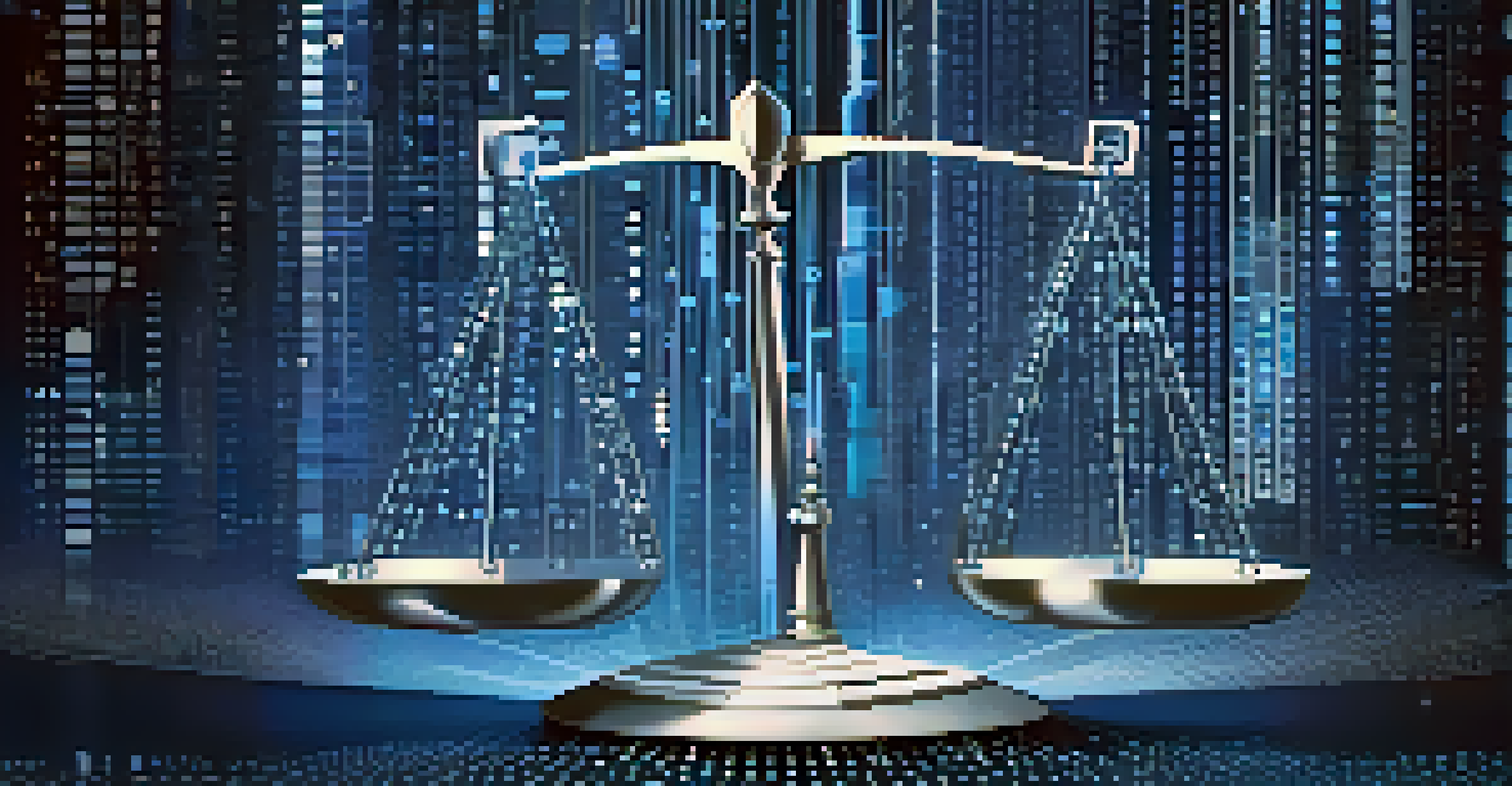Big Data and Ethics: Balancing Innovation and Responsibility

Understanding Big Data: What Is It and Why It Matters
Big Data refers to the vast volumes of structured and unstructured data generated every second by various sources, like social media, IoT devices, and business transactions. This data, too large for traditional processing methods, holds immense potential for uncovering insights that can drive innovation and efficiency in diverse sectors. In essence, Big Data is like a treasure chest; the more you explore it, the more valuable information you can extract.
Data is the new oil. It’s valuable, but if unrefined, it cannot really be used.
However, with great power comes great responsibility. The potential to analyze and leverage this data raises significant ethical questions that must be addressed. For instance, how are these insights used, and who benefits from them? It’s crucial to balance the innovative possibilities with the ethical implications of data usage.
Ultimately, understanding Big Data is the first step towards navigating the complexities of its ethical landscape. By exploring its definition and importance, we set the stage for a deeper discussion on the responsibilities that accompany its use.
The Ethical Dilemmas of Data Collection and Usage
When it comes to data collection, ethical dilemmas often arise around privacy and consent. Organizations may gather vast amounts of data from users, sometimes without their explicit permission, leading to a breach of trust. Imagine going to a party where everyone is sharing their secrets, and you’re secretly recording it all—it's a violation of personal space that can have real-world consequences.

Moreover, how this data is used can further complicate ethical considerations. For example, data-driven decisions in hiring or lending can inadvertently perpetuate biases if the underlying data reflects historical inequalities. This raises questions about fairness and accountability, highlighting the need for responsible data practices.
Big Data's Ethical Challenges
The vast potential of Big Data brings significant ethical dilemmas, particularly around user privacy and consent.
Addressing these dilemmas requires a commitment to transparency and ethical standards in data handling. By prioritizing user consent and fair practices, organizations can create a more trustworthy environment that respects individual rights.
The Role of Transparency in Ethical Data Practices
Transparency is a cornerstone of ethical data practices. It involves openly sharing how data is collected, processed, and utilized, allowing users to make informed choices. Think of it as a recipe; if you’re not told what ingredients are being used, you can’t be sure about the end dish’s quality and safety.
With great power comes great responsibility.
When organizations are transparent about their data practices, they foster trust with their customers. This trust not only enhances brand loyalty but also encourages users to engage more openly, providing richer data for analysis. Without transparency, users may feel wary, akin to walking into a room full of strangers where you’re not sure who to trust.
Ultimately, transparency empowers users and enables organizations to demonstrate their commitment to ethical standards. By being upfront about data practices, companies can navigate the complex landscape of Big Data while maintaining integrity.
Impact of Big Data on Individual Privacy Rights
As Big Data continues to evolve, so do concerns about individual privacy rights. With the ability to collect and analyze data from countless sources, organizations may inadvertently infringe on personal privacy. It’s like having a window into someone’s life; just because you can see in doesn’t mean you should.
The challenge lies in striking a balance between leveraging data for innovation and protecting individual privacy. Users deserve to know how their information is being used and have the right to control it. For instance, regulations like GDPR in Europe have set a precedent for data protection, emphasizing the importance of privacy in the data era.
Transparency Builds Trust
Openly sharing data practices fosters trust between organizations and users, encouraging responsible data engagement.
Protecting privacy is not just about compliance; it's about respecting individuals. By prioritizing privacy rights, organizations can build a more ethical approach to data that aligns with societal values.
The Role of Regulations and Standards in Data Ethics
Regulations and standards are essential in guiding organizations toward ethical data practices. Laws like the General Data Protection Regulation (GDPR) and the California Consumer Privacy Act (CCPA) set clear expectations for how data should be collected and handled. Think of these regulations as the traffic lights in the data highway; they help prevent chaos and ensure that everyone knows the rules of the road.
Compliance with such regulations not only protects consumers but also fosters a culture of accountability within organizations. When companies prioritize ethical standards, they signal to their customers that they value their privacy and security, which can further enhance trust.
Ultimately, regulations serve as a framework to navigate the complexities of Big Data ethics. By adhering to established standards, organizations can innovate responsibly and maintain public confidence.
Innovative Solutions for Ethical Data Management
In the quest for ethical data management, innovative solutions are emerging to address the challenges posed by Big Data. Technologies like blockchain offer a way to secure data while maintaining transparency and user control. Imagine it as a digital ledger where every transaction is visible, ensuring that data usage is tracked and accountable.
Additionally, machine learning algorithms can be designed with fairness in mind, helping to eliminate biases in data-driven decisions. By incorporating ethical considerations into the development process, organizations can create tools that not only perform effectively but also uphold moral standards.
Regulations Guide Ethical Use
Compliance with regulations like GDPR and CCPA establishes clear ethical standards for data collection and usage.
These innovative solutions demonstrate that it’s possible to harness the power of Big Data while adhering to ethical principles. By embracing technology that promotes responsibility, organizations can lead the way in ethical data management.
Fostering a Culture of Ethical Data Awareness
Fostering a culture of ethical data awareness within organizations is crucial for ensuring responsible practices. This involves educating employees about the importance of ethics in data usage and encouraging open discussions about potential dilemmas. Think of it as building a community garden where everyone contributes to maintaining its health and integrity.
Regular training and workshops can empower employees to recognize ethical challenges and make informed decisions. By creating an environment where ethical considerations are prioritized, organizations can cultivate a workforce that values responsibility in data handling.

Ultimately, a culture of ethical awareness not only benefits the organization but also enhances public trust. When employees are equipped to navigate ethical issues, they contribute to a more responsible approach to Big Data.